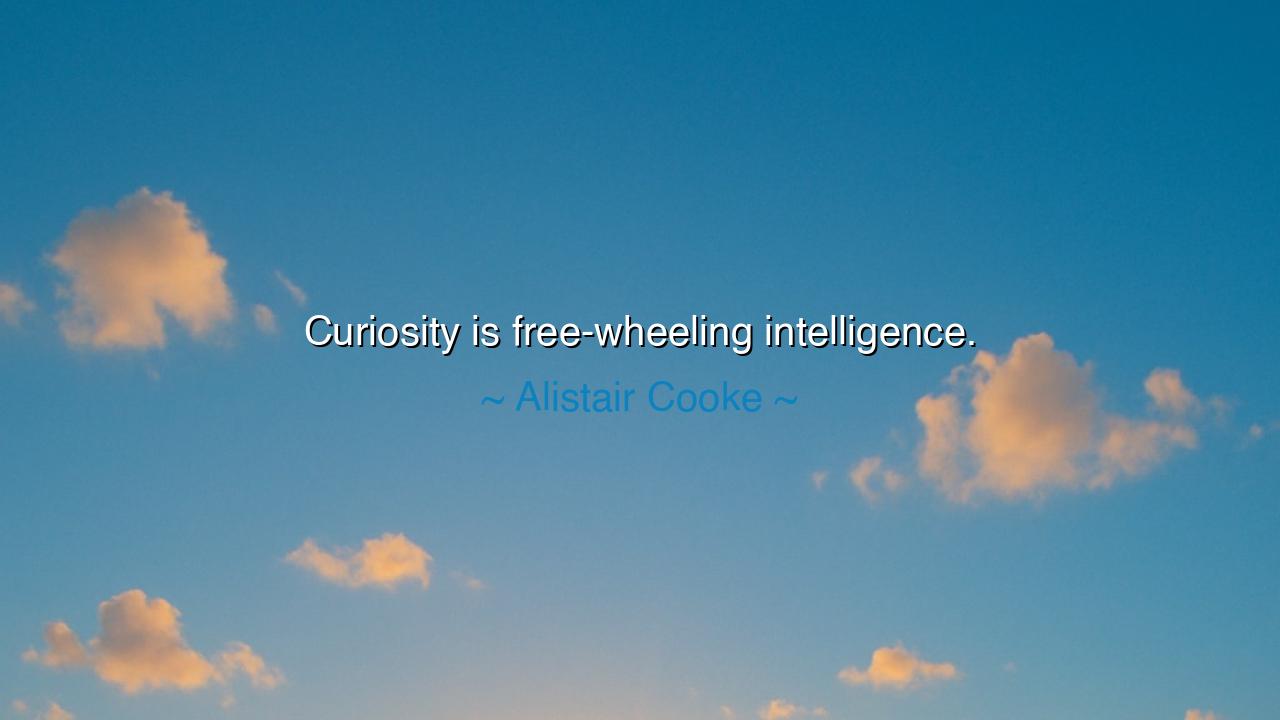
Curiosity is free-wheeling intelligence.






The words “Curiosity is free-wheeling intelligence,” spoken by Alistair Cooke, the British-American journalist, broadcaster, and essayist, carry within them a spark of timeless truth. In this short but profound phrase, Cooke captures the living essence of what it means to think freely—to allow the mind to move with wonder, unbound by fear, pride, or rigid purpose. Curiosity, he tells us, is not idle wandering; it is intelligence in motion, liberated from walls and boundaries. It is the child of thought and the parent of discovery.
To call curiosity “free-wheeling” is to see it as an energy that moves where it will—like wind through open fields or a wheel rolling down an unseen path. It is intelligence released from the narrow lanes of duty, wandering joyfully through the unknown. The curious mind is not content to accept the surface of things. It asks, why? how? what if? It seeks to understand not for gain, but for the pleasure of understanding itself. Cooke, a man of words and worlds, knew this truth deeply. In his career as a storyteller, he traveled through cultures and ideas with an openness that reflected the vitality of his saying.
In his time, Alistair Cooke witnessed the world transform—from the rise of radio to the birth of television, from the wars that scarred nations to the wonders of modern science. Yet he saw that the true power of the human spirit was not in machines or wealth, but in the intelligence that dares to wander. To be curious, in Cooke’s eyes, was the highest form of freedom—the mind’s refusal to be tamed. While others sought to master knowledge for control, the curious sought it for communion, to understand and connect with the world in all its mystery.
History abounds with those whose free-wheeling curiosity reshaped human destiny. Consider Leonardo da Vinci, who peered into the anatomy of man and the flight of birds with equal wonder. He was not bound to one discipline, nor driven by profit or rank. His curiosity was like a river, winding where it pleased—sometimes through art, sometimes through science, sometimes through invention. Many of his discoveries lay unfinished, yet each bore the mark of genius born not of ambition, but of unrestrained wonder. Leonardo proved that intelligence unchained from fear becomes creation itself—the divine spark moving through human hands.
Yet Cooke’s quote also bears a warning to our age. Too often, intelligence is imprisoned by the demand for usefulness, by systems that value results over understanding. Children are taught to answer, not to question. Workers are trained to obey, not to explore. And thus, the light of curiosity—our most human gift—begins to dim. Cooke’s words remind us that the mind must move freely if it is to remain alive. A caged intelligence may produce, but it cannot dream. And without dreams, knowledge becomes sterile, lifeless, and cold.
To live by Cooke’s wisdom is to cultivate curiosity as a practice of the soul. It means walking through the world as both student and seeker. It means reading not only for facts, but for wonder; listening not only to reply, but to understand. It means daring to explore ideas that frighten or challenge you, for it is in those frontiers that true learning begins. The curious mind is never satisfied—and that is its glory. It knows that every answer births another question, and every discovery opens a deeper mystery.
So let this be the teaching: curiosity is the breath of intelligence. It keeps the mind young, the heart open, and the world forever new. Feed it with books, with questions, with silence and observation. When you look upon the ordinary, see the miraculous hidden beneath. When you hear an unfamiliar idea, follow it as a traveler follows a path through a strange land. For as Alistair Cooke reminds us, curiosity is not aimless—it is the natural movement of the awakened mind, forever reaching toward the infinite.
And thus, O seeker of wisdom, remember: the measure of your intelligence is not what you know, but what you long to know. Keep your mind free-wheeling, your eyes open, and your heart unafraid. For it is curiosity—the sacred hunger to understand—that turns existence from routine into revelation, and transforms a single human life into a lifelong adventure of the soul.






AAdministratorAdministrator
Welcome, honored guests. Please leave a comment, we will respond soon